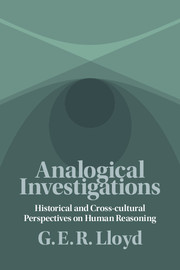Book contents
- Frontmatter
- Contents
- List of diagrams
- Introduction
- 1 On the very possibility of mutual intelligibility
- 2 The multiple valences of comparatism
- 3 Analogies, images and models in ethics: some first-order and second-order observations on their use and evaluation in ancient Greece and China
- 4 Analogies as heuristic
- 5 Ontologies revisited
- 6 Conclusions
- Glossary of Chinese terms
- Notes on editions
- Bibliography
- Index
Introduction
Published online by Cambridge University Press: 05 September 2015
- Frontmatter
- Contents
- List of diagrams
- Introduction
- 1 On the very possibility of mutual intelligibility
- 2 The multiple valences of comparatism
- 3 Analogies, images and models in ethics: some first-order and second-order observations on their use and evaluation in ancient Greece and China
- 4 Analogies as heuristic
- 5 Ontologies revisited
- 6 Conclusions
- Glossary of Chinese terms
- Notes on editions
- Bibliography
- Index
Summary
Western philosophy and science are jointly responsible for constructing some amazingly powerful tools of investigation, aimed at discovering the truth, delivering explanations, verifying conjectures, showing that inferences are sound and proving results conclusively. We use the scientific method and logic to achieve all that, and further back those two depend not just on the precision and accuracy of measurements and the replicability of results, but also on the clarity of definition, the avoidance of ambiguity and above all the univocity of terms. If those criteria are not met, the enterprise aborts.
These ideas and practices as we know them today happen to have been developed first, in most cases, in Europe, though adumbrations of several of them are to be found elsewhere. But how should we evaluate our European legacy? Most people throughout the world, and not just Westerners, probably assume straightforwardly that those tools represent an unqualified success, for have they not been responsible for most of the progress humans have ever made, both in understanding and in improving material welfare, not least in the matter of our health and ability to combat disease?
But doubts and criticisms have also been and continue to be expressed. One group of dissenters resents the hegemonic tones in which the West implicitly or explicitly claims superior rationality, intelligence, know-how, although that resentment does not of itself further the evaluation of the key ideas and methods. Some dismiss the claims for better understanding as a mirage, with the relativist's argument that everyone's notion of understanding is dependent on subjective or at least society-specific norms. Even claims to increase material prosperity are sometimes countered by pointing to the harm and destruction that have followed in the wake of technological advance, from weapons of mass destruction to global warming.
However, the debate to date pays less attention than it might to pressing the analysis of what I have called those tools of investigation. As a historian I am aware of some of the contingent circumstances in which certain crucial ideas were developed, often starting in ancient Greece. As a comparativist I can use other cultures to trace trajectories of intellectual development and ambition that differ from those we are used to in the West. The studies that I have gathered together in this book contain some philosophical reflections on the multiple tracks that human endeavours to achieve both understanding and the control of the environment have followed. These investigations are then ‘analogical’, in the broad sense in which I shall use that term, in two ways: first in the sense that they are comparative, probing the similarities and differences between what I have called those trajectories, but, secondly, in a further sense in that it turns out that the use of analogies, models, images and similarities (even though often viewed with suspicion) is all-pervasive. The object of the exercise is to test both the strengths and the weaknesses of common assumptions about what is held up as the right, indeed often the only viable, track.
- Type
- Chapter
- Information
- Analogical InvestigationsHistorical and Cross-Cultural Perspectives on Human Reasoning, pp. 1 - 9Publisher: Cambridge University PressPrint publication year: 2015

